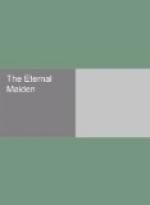It was not long before she heard—or imagined—the angry cries of pursuing natives behind her.
X
“A frail, pitiful figure Annadoah stood on the cliff, wringing her hands toward the declining sun . . . ‘I-o-h-h-h,’ she moaned, and her voice sobbed its pathos over the seas. ’I-o-h-h-h! I-o-h-h-h, Sukh-eh-nukh! Unhappy sun—unhappy sun! I-o-h-h-h, Annadoah—unhappy, unhappy Annadoah!’”
Twenty miles to the south, on a great cliff which stepped stridently into the polar sea, stood a house built of stray timber and boxes which, for a half decade, had been the summer headquarters of parties of Danish and Newfoundland traders who came north annually and scoured Greenland for ivories and furs. The hulk of a house was weather-beaten, dilapidated, and scarred black by the burning cold. A more desolate habitation could not be imagined in all the world, a more devastated land could nowhere else on all the globe be found. For leagues and leagues to the north and south, the scrofulous promontories lay barren under the blight of the merciless northern blasts. Over the corroded iron rocks strata of red earth and deeper crimson ore ran like the streaky stains of monstrous and unhuman murders committed in aeons past. Not a particle of vegetation was visible; there were no lichens nor starry flowers. There was no life save that of the black birds which winged restlessly about the sky and squawked in grotesque mockery at the region and its doom. In strange contrast, the sky was as blue as the limpid skies of Umbria,—and nearly two hundred feet below the gnarled gashed cliff the ocean broke in terrific cascades of diamonded foam.
The top of the cliff on which the house stood overleaped the sea, so that, looking below, one saw only the recoiling waters of a rich, deep gold, capped with silver crescents of broken spray. From the sheer precipitous receding face of the cliff, knife-like granite spars projected, and in the crevices and nooks of these countless birds nested. Hungry, desirous, insatiate—the voice of that fearful and balefully luring world—there sounded eternally the roar and crash of the breaking golden waves.
Over the uneven scraggy promontory, blinded by the fierce sunlight, Annadoah staggered. The world reeled about her; the sky above her had become black. Before her—a small speck in the distance—she saw the black wooden house silhouetted against the molten sea. She could scarcely move her legs; she ached in every limb; every moment she felt as if she would swoon, but the frenzied fear in her heart urged her on. She suffered intolerably.
Of that long, tortuous journey Annadoah had no clear remembrance—with each step her one urging, predominant thought had been to forge ahead, to keep from swooning,—to escape those who were angrily calling far behind.
Leaving her village, along the difficult broken coast her trail lay; it crept painfully up over the slippery sides of melting glaciers, some of them a thousand feet high, and made sheer descents over places where the ice was splitting; it writhed about hundreds of irregular sounds and twisted fjords.




